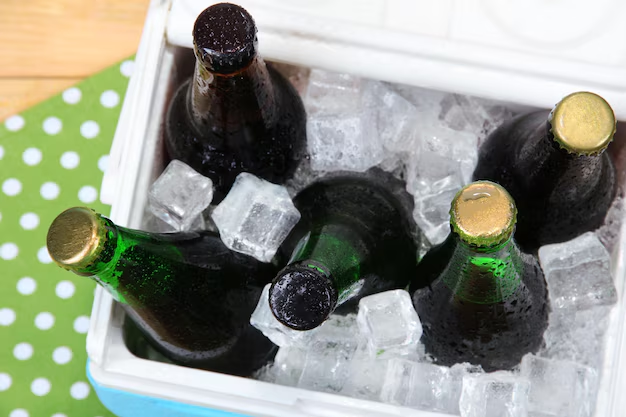How Long Does Coquito Last in the Refrigerator? A Comprehensive Guide to Enjoying This Festive Drink Safely
As the holiday season approaches, many people excitedly anticipate the return of traditional festive drinks like coquito. This creamy, coconut-flavored delight, often dubbed the Puerto Rican eggnog, brings warmth and cheer to gatherings. But as you prepare a batch of this beloved drink, a common question arises: "How long can coquito be safely stored in the refrigerator?" Understanding the shelf life of coquito is crucial for both your enjoyment and your health. In this guide, we'll explore coquito storage tips, potential factors affecting its longevity, and best practices for ensuring that each sip remains as delightful as the first.
🎄 What is Coquito?
Coquito is a traditional Puerto Rican drink that, much like eggnog, is enjoyed during the holiday season. It's typically made with coconut milk, cream of coconut, sweetened condensed milk, cinnamon, nutmeg, white rum, and vanilla extract. Some variations include egg yolks for added richness or other spices to tailor the flavor profile.
Key Ingredients of Coquito:
- Coconut Milk: Forms the creamy base of the drink.
- Cream of Coconut: Adds sweetness and depth.
- Condensed Milk: Contributes to the drink's thickness.
- Rum: Provides a warming kick, with white rum being the preferred choice.
- Spices: Cinnamon, nutmeg, and vanilla enhance the aroma and flavor.
🕒 Factors Affecting Coquito's Shelf Life
The longevity of coquito in the refrigerator can vary depending on several factors. Here are key considerations:
1. Ingredients Used
The choice of ingredients plays a critical role. Traditional recipes using eggs may have a shorter shelf life compared to those without, as eggs can perish relatively quickly. Additionally, natural ingredients versus artificial preservatives can affect how long your coquito will last.
2. Alcohol Content
Alcohol acts as a preservative. A higher alcohol content can extend the shelf life of coquito by creating an environment less hospitable to bacteria and spoilage.
3. Storage Conditions
Proper storage is vital for prolonging the shelf life. Coquito should always be stored in airtight containers to prevent exposure to air, which can accelerate spoilage. Keeping it at a consistent, cool temperature in the refrigerator is also essential.
4. Freshness of Ingredients
Using fresh ingredients will naturally extend the shelf life of your coquito. Ensure that all dairy products and coconut milk are fresh and check expiration dates before use.
🔍 How Long Can You Refrigerate Coquito?
Generally, coquito can last in the refrigerator for anywhere from four days to several weeks, depending largely on the factors mentioned above. Here's a breakdown:
- Without Eggs: If your recipe excludes eggs and has a moderate to high alcohol content, it can last around two to four weeks.
- With Eggs: Coquito recipes containing eggs tend to have a shorter shelf life, usually lasting about three to five days, even with refrigeration.
- Alcohol as a Preservative: Increasing the amount of rum not only intensifies flavor but can also help keep the coquito safe to drink for a longer period, often extending its shelf life over a month.
✅ Best Practices for Storing Coquito
📦 Airtight Containers
Use glass bottles or jars with tight lids to store coquito. This prevents air from entering and reduces the risk of spoilage.
❄️ Consistent Refrigeration
Maintain a consistent refrigeration temperature. Coquito should always be kept chilled to inhibit bacterial growth.
📅 Label and Date
Always label your containers with the date of preparation. This helps track how long the coquito has been stored and ensures you consume it while it's fresh.
🥄 Taste Test
Before serving, perform a quick taste test to check for any signs of spoilage like sourness or an off-putting smell.
🥛 Tips for Enhancing Coquito's Shelf Life
- Substitute Eggs: If worried about shelf life, consider swapping eggs for more cream of coconut or condensed milk for added richness without the spoilage risk.
- Pulse Spices: Rather than adding whole spices, using ground spices can help distribute flavors more evenly and potentially aid in preservation.
- Refrigeration First, Then Freeze: If you have leftover coquito and fear spoilage, consider freezing portions. Remember to leave room for expansion in the container to prevent breakage.
🔎 Identifying Spoiled Coquito
Even with careful storage, coquito can spoil. Recognizing the signs of spoilage is crucial to avoid consumption that could lead to foodborne illness.
Signs of Spoilage:
- Sour Odor: A vinegar-like or off smell indicates spoilage.
- Discoloration: Darkened or uneven coloring might suggest bacterial growth.
- Strange Texture: Any curdling or separation that doesn't blend when shaken could be a warning sign.
📋 Summary: Key Takeaways for Storing Coquito
- 🥄 Exclude or Monitor Eggs: If using eggs, consume quickly. Without eggs, coquito can last longer.
- 🍶 Increase Alcohol Content: Alcohol prolongs shelf life by acting as a preservative.
- ❄️ Keep Refrigerated: Consistent cool temperatures prevent spoilage.
- 📅 Track Preparation Date: Helps manage consumption period.
- 🧴 Use Airtight Containers: Limits exposure to air and bacteria.
Understanding these principles will help you store coquito safely and enjoy its festive flavors for as long as possible, adding cheer and warmth to any gathering.
🎉 Closing Insight
Preparing and sharing coquito is more than a culinary tradition—it's a celebration of culture and community. Whether you're hosting a holiday gathering or enjoying a quiet evening at home, knowing how long coquito can be kept in the refrigerator ensures that each glass is safe and delicious, allowing you to focus on what truly matters: creating joyful memories with friends and loved ones.

